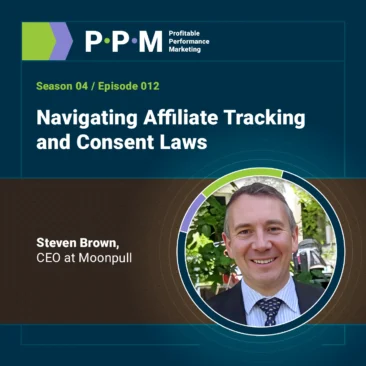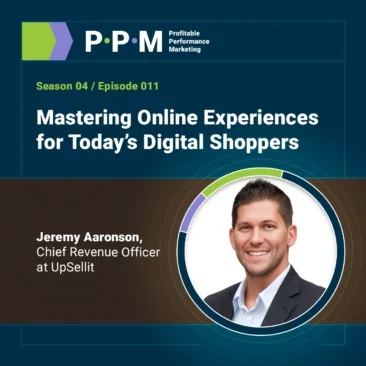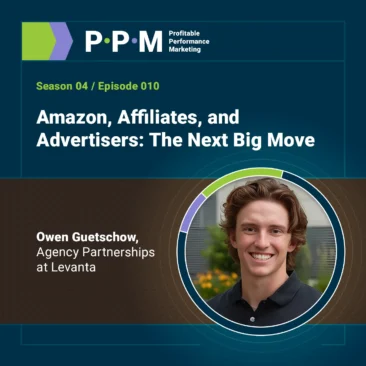Season 01 / Episode 020
Don Batsford Jr. – Let People Be People, Let Computers Do Division
Guest: Don Batsford Jr - Head of Industry at Google
Note: if you get only a 30 second preview, please log into your Spotify account, or find us on one of several other podcast services.
Summary
22 year digital marketing vet, Don Batsford Jr., is today’s guest on the Profitable Performance Marketing Podcast. I met Don while he owned and operated 31 Media, a search agency and one of the best known search affiliates in the space.
Currently Don is Head of Industry at Google, working with some of the largest advertisers in the space. He and his team help them optimize their campaigns across Google’s products.
Don and I talk about the 3 universal truths, action items marketers can take, the impact of machine learning on our world and on our marketing and some key leadership lessons he has learned over the years. You are going to love this episode.
You can contact don at Linkedin and Twitter.
And don’t forget, we put together a case study focused on controlling customer acquisition costs. This case study highlights the commission structure, technology utilization and promotional strategies we use for our clients’ affiliate programs to help them increase their overall revenue while reducing their cost of acquisition. It can be done, and we outline that in this case study. Get your strategy today.
About Our Guest:
Don has been in this industry for over 22 years and is currently head of industry at Google, leading a team of digital marketing experts, data analysts, & media specialists that partner with the CMOs of Google’s largest advertisers to grow their businesses.
Previously, Don was the managing director and founder of MAQQ, an Internet advertising agency, specializing in paid search and ROI focused campaigns.
Google on the Web
Listen
Share
Notify
Top Tips
Anybody at any time can be part of a successful team. Don discusses multiple studies that have been done at Google in which they challenge if it’s the people on a team or if it’s how a team interacts that ultimately determines success. One of the most surprising findings is that any team can be successful. He mentions that early on, companies focused on hiring the “perfect” candidate (Ivy league, valedictorian etc.) and didn’t consider the team dynamic or environment. The determining factor of success in these studies was a psychological feeling of safety among team members.
Providing both structure and clarity is a must as a leader. Don explains that when leading a team, you must provide structure and clarity. You must know what you are working towards and how you are going to get there. You also need to make sure people feel comfortable asking questions, admitting mistakes and taking risks. People should be allowed to be bold and curious, and ultimately, themselves. Diversity of thought, person and approach is extremely critical in a successful workplace.
There are three universal truths in the digital industry. Don talks about three truths that have stayed the same throughout his 22-year career and that he doesn’t expect to change anytime soon. The first is the need to respect individual user privacy. Respecting individuals’ wishes about how their data is used has been consistent. The second is the continued growth and connectivity – the devices, the speed, and their abilities. The third is the increasing capability of machine learning. When you take the ability to understand, process and pull patterns out of huge data sets, and combine it with instant connectivity, you can almost see a future where there isn’t a problem you can’t throw very significant resources at. We as humans need to think about the biggest “fire” that needs our resources.
Highlights
It doesn’t matter WHO you work for, what matters is your value proposition.
“When you make those moves back and forth (between being your own boss and working for a company), you start to understand that ultimately your value proposition to the greater market is what relationships you can build and what results you can drive. The greater ecosystem of it is not as important as you would think. It becomes all about you doing a good job, focusing on the task at hand and being mindful. These are the things that come into focus.”
Let people be people, let computers do the division.
“The affiliate space is one of these wonderful things in that it is a true ‘ask the new questions’ kind of field. Entrepreneurial individuals can get connected with very significant brands and it’s a quantitative industry. It’s not based on assumptions, it’s based on metrics and KPIs. I would say the model of performance advertising is not going anywhere. Data driven attribution is something that is going to be increasingly interesting and I would say that affiliate marketers could lean into data driven attribution by asking ‘what are am I doing to bring someone through the conversion funnel?”
Quotes
[15:27] – “What’s wonderful is that the work that you and I do, such as understanding multiple client’s business objectives and breaking those down into actions, driving teams forward to the goal of growth and profitability, those are all bedrock conversations I have every day at Google.”
[21:02] – “Most people should consider that the role you (they) have was built on thousands, upon thousands of people working very hard to make it an opportunity. I don’t ever try to lose sight of that. To pay it forward with my 4 kids, I ask myself, what will they benefit from? What about their kids and grandkids? Hopefully they will have something they can say is beneficial from their time with me.”
[47:48] – ““Machine learning is happening right now, even in marketing. For example, the way that ads are written. You provide raw assets and it pulls the assets, understands unique combinations that go with certain markets and audiences, and understands how much to bid. If an ad isn’t relevant to a user, it’s really a miss. “





